初中形容词和副词的比较级最高级
语法精讲10,形容词副词的比较级和最高级(考点+中招真题)
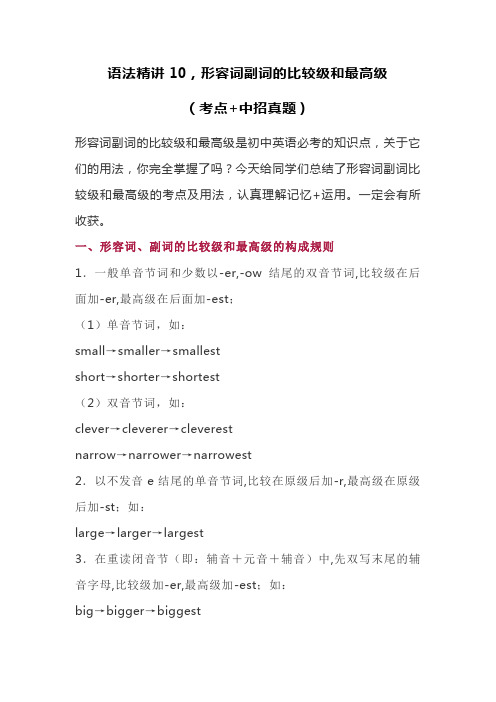
语法精讲10,形容词副词的比较级和最高级(考点+中招真题)形容词副词的比较级和最高级是初中英语必考的知识点,关于它们的用法,你完全掌握了吗?今天给同学们总结了形容词副词比较级和最高级的考点及用法,认真理解记忆+运用。
一定会有所收获。
一、形容词、副词的比较级和最高级的构成规则1.一般单音节词和少数以-er,-ow结尾的双音节词,比较级在后面加-er,最高级在后面加-est;(1)单音节词,如:small→smaller→smallestshort→shorter→shortest(2)双音节词,如:clever→cleverer→cleverestnarrow→narrower→narrowest2.以不发音e结尾的单音节词,比较在原级后加-r,最高级在原级后加-st;如:large→larger→largest3.在重读闭音节(即:辅音+元音+辅音)中,先双写末尾的辅音字母,比较级加-er,最高级加-est;如:big→bigger→biggesthot→hotter→hottestfat→fatter→fattest4.以“辅音字母+y”结尾的双音节词, 把y改为i,比较级加-er,最高级加-est;如:easy→easier→easiestheavy→heavier→heaviest5.其他双音节词和多音节词,比较级在前面加more,最高级在前面加most;如:beautiful→more beautiful→most beautifuldifferent→more different→most differenteasily→more easily→most easily注意:(1)形容词最高级前通常必须用定冠词 the,副词最高级前可不用.The Sahara is the biggest desert in the world.(2)形容词most前面没有the,不表示最高级的含义,只表示"非常".It is a most important problem.=It is a very important problem.6.有少数形容词、副词的比较级和最高级是不规则的,必须熟记。
初中知识点归纳形容词和副词的比较级和最高级的特殊用法与句型转换

初中知识点归纳形容词和副词的比较级和最高级的特殊用法与句型转换形容词和副词是英语中非常重要的词类,用于描述人、事物和动作。
其中,比较级和最高级是形容词和副词常用的语法形式。
本文将对形容词和副词的比较级和最高级进行归纳总结,并介绍一些特殊用法和句型转换。
一、形容词比较级和最高级的构成规则形容词的比较级和最高级通常是在词尾加上-er和-est,但也存在一些特殊规则。
这里给出一些常见的构成规则和特殊形式:1. 单音节形容词:比较级:原级 + er最高级:原级 + est例如:- small(小) - smaller(更小) - the smallest(最小)- tall(高) - taller(更高) - the tallest(最高)2. 以辅音字母+y结尾的形容词:比较级:去y,变i + er最高级:去y,变i + est- happy(快乐) - happier(更快乐) - the happiest(最快乐)- easy(容易) - easier(更容易) - the easiest(最容易)3. 以e结尾的形容词:比较级:直接加r最高级:直接加st例如:- wide(宽) - wider(更宽) - the widest(最宽)- safe(安全) - safer(更安全) - the safest(最安全)4. 以重读闭音节结尾的形容词:比较级:双写末尾辅音字母 + er最高级:双写末尾辅音字母 + est例如:- big(大) - bigger(更大) - the biggest(最大)- hot(热) - hotter(更热) - the hottest(最热)5. 不规则形容词:有一些形容词的比较级和最高级是不规则的,需要特别记忆。
- good(好) - better(更好) - the best(最好)- bad(坏) - worse(更坏) - the worst(最坏)二、副词比较级和最高级的构成规则副词的比较级和最高级通常是在形容词的比较级和最高级前面加上more和most。
初中英语比较级和最高级

A. a little more
B. a few more
C. much
D. a little
3. Sam is __________ at Chinese than Jim. A. good
B. well
C. better
D. gooder
4. This one is too large. Can you show me a
12. The weather in North China is colder than
__________ in South China.
A. one B. this
C. the one D. that
13. Which one is __________, this one or that
My sister is __m__o__re_____ intellectual (聪明的) than
me at study. 5. Peter is funny. Paul is funny, too. (合并成一句)
Peter is ___a_s___ funny ___a_s____ Paul.
他和他的哥哥一样瘦。 Tom 和Jim 跑得一样快。
2. 表示一方在某一方面不及另一方时 A+be+not+as / so+形容词原形+as+B A+don’t / doesn’t / didn’t+行为动词原形+ as / so+副词原形+as+B
e.g.
She is not as/so beautiful as his sister. I don’t sing as / so loudly as my sister.
形容词和副词比较级和最高级变化规则

形容词和副词比较级和最高级变化规则1.规则变化1 一般情况下;单音节或双音节的形容词或副词比较级+er ;最高级+est 如: clever-cleverer-cleverestfew-fewer-fewestsmall-smaller-smallest等..2 以e结尾的词;比较级+r;最高级+st 即可.. 如:nice-nicer-nicest cute-cuter-cutest large-larger-largest3 以辅音字母+y结尾的变y为i+er或est..如:easy-easier-easiest happy-happier-happiest再如:early; busy; heavy; dirty; lazy也如此..少数单音节词也是这样;如:pleased-more pleased-the most pleasedtired-more tired-the most tired4中读闭音节词双写后面的辅音比较级+er ;最高级+est如:big-bigger-biggest thin-thinner-thinnest2. 不规则变化:good —better — best well —better — bestbad-worse - worstmany / much — more — mostfar — farther —farthest 距离远far — further — furthest 程度深old — elder — eldest 长幼old — older —oldest 年龄Step 2 中考链接1. 比较级考点①比较级修饰问题a little; a bit; even; still; much; a lot; far 等可修饰比较级..e.g. Tom is a little taller than Jim.This book is much more interesting than that one.②同级比较e.g. The weather in Beijing is colder than that in Xi’an.Our school is bigger than yours.③ the + 比较级e.g. Lucy is the fatter of the two girls.④“a/an + 比较级” 表示“又一;再一”e.g. Lily has a doll; but she wants a bigger one.⑤隐性比较没有than的情况e.g. Who runs faster; Lucy or LilyYou’d better come earlier next time.He worked hard last term; but he works even harder this term.⑥越来越......a. 比较级 + and + 比较级b. the + 比较级 + 句子;the + 比较级 + 句子a. e.g. It’s getting colder and colder.The more you exercise; the better you are.2. 最高级考点说明:形容词的最高级前必须加the; 副词的最高级前省略the..①范围问题e.g. Tom is the tallest student in the class.Spring is the best season of the year.②“......之一”问题e.g. Beijing is one of the biggest cities in the world.③“the + 序数词 + 最高级”e.g. I think he is the second tallest boy in his class.3. 比较级和最高级的转换e.g. Tom is the tallest student in the class.= Tom is taller than any other student in the class.= Tom is taller than all the other students in the class.= No other students are taller than Tom.2. 同级比较① as + adj./adv. + ase.g. She is as thin as Lily.He writes as carefully as Linda.② not + as/so + adj./adv. + ase.g. Tony didn't run so fast as Carter中考真题1. Our family has bought a car so we can travel _____ than before.A. most easilyB. less easilyC. easilyD. more easily2. My father told me a story last night. It is ____ one I’ve ever heard.A. the funniestB. funniestC. funnierD. the funnier3. The _____ friends you have; the ____ you will be.A. more; happyB. many; happyC. more; happierD. many; happier4. When he heard a cry for help; he ran out as _______ as he could.A. hardlyB. quicklyC. finallyD. slowly5. This place is not big enoug h for Lucy’s birthday party. We should find a _____ one.A. bigB. smallC. biggerD. smaller。
100个七八年级形容词副词的比较级和最高级
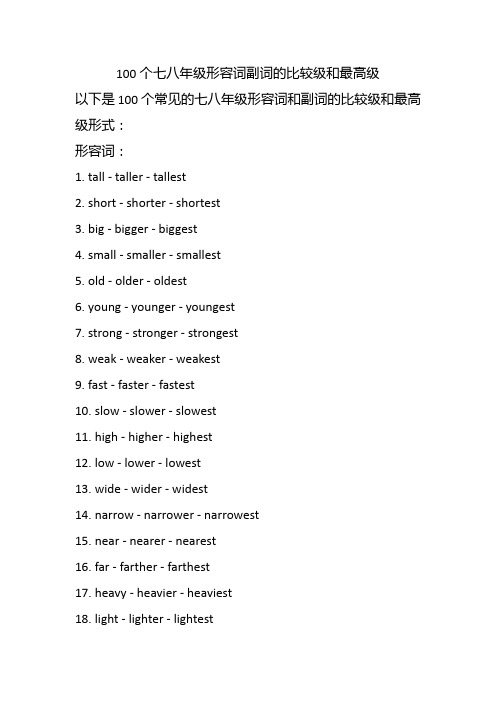
100个七八年级形容词副词的比较级和最高级以下是100个常见的七八年级形容词和副词的比较级和最高级形式:形容词:1. tall - taller - tallest2. short - shorter - shortest3. big - bigger - biggest4. small - smaller - smallest5. old - older - oldest6. young - younger - youngest7. strong - stronger - strongest8. weak - weaker - weakest9. fast - faster - fastest10. slow - slower - slowest11. high - higher - highest12. low - lower - lowest13. wide - wider - widest14. narrow - narrower - narrowest15. near - nearer - nearest16. far - farther - farthest17. heavy - heavier - heaviest18. light - lighter - lightest19. dangerous - more dangerous - most dangerous20. easy - easier - easiest21. busy - busier - busiest22. quiet - quieter - quietest23. beautiful - more beautiful - most beautiful24. delicious - more delicious - most delicious25. expensive - more expensive - most expensive26. cheap - cheaper - cheapest27. hot - hotter - hottest28. cold - colder - coldest29. clean - cleaner - cleanest30. dirty - dirtier - dirtiest31. good - better - best32. bad - worse - worst33. strong - stronger - strongest34. weak - weaker - weakest35. tall - taller - tallest36. short- shorter- shortest37. long- longer- longest38. narrow- narrower- narrowest39. early- earlier- earliest40. late- later- latest41. big- bigger- biggest42. beautiful- more beautiful- most beautiful43. safe- safer- safest44. near- nearer- nearest45. round- rounder- roundest46. thin- thinner- thinnest47. good- better- best48. fast- faster- fastest49. hot- hotter- hottest50. low- lower- lowest51. fat- fatter- fattest52. happy- happier- happiest53 late later latest54 simple simpler simplest55 near nearer nearest56 easy easier easiest57 quiet quiter quitest58 hard harder hardest59 big bigger biggest60 small smaller smallest61 hotter hottest hottest62 cold colder coldest63 thin thinner thinnest64 hard harder hardest65 tall taller tallest66 old older oldest67 new newer newest68 wide wider widest69 long longer longest70 short shorter shortest71 big bigger biggest72 small smaller smallest73 hot hotter hottest74 cold colder coldest75 good better best76 bad worse worst77 beautiful more beautiful most beautiful78 delicious more delicious most delicious79 expensive more expensive most expensive80 cheap cheaper cheapest81 fast faster fastest82 slow slower slowest83 high higher highest84 low lower lowest85 big bigger biggest86 small smaller smallest87 good better best88 bad worse worst89 beautiful more beautiful most beautiful90 delicious more delicious most delicious91 expensive more expensive most expensive92 cheap cheaper cheapest93 fast faster fastest94 slow slower slowest95 high higher highest96 low lower lowest97 big bigger biggest98 small smaller smallest99 good better best100 bad worse worst。
形容词与副词的比较级与最高级形式与用法
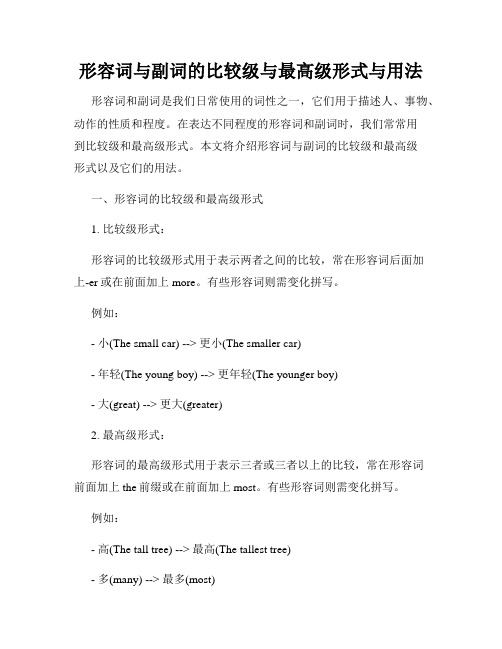
形容词与副词的比较级与最高级形式与用法形容词和副词是我们日常使用的词性之一,它们用于描述人、事物、动作的性质和程度。
在表达不同程度的形容词和副词时,我们常常用到比较级和最高级形式。
本文将介绍形容词与副词的比较级和最高级形式以及它们的用法。
一、形容词的比较级和最高级形式1. 比较级形式:形容词的比较级形式用于表示两者之间的比较,常在形容词后面加上-er或在前面加上more。
有些形容词则需变化拼写。
例如:- 小(The small car) --> 更小(The smaller car)- 年轻(The young boy) --> 更年轻(The younger boy)- 大(great) --> 更大(greater)2. 最高级形式:形容词的最高级形式用于表示三者或三者以上的比较,常在形容词前面加上the前缀或在前面加上most。
有些形容词则需变化拼写。
例如:- 高(The tall tree) --> 最高(The tallest tree)- 多(many) --> 最多(most)二、副词的比较级和最高级形式1. 比较级形式:副词的比较级形式与形容词相同,可以在后面加上-er或在前面加上more。
例如:- 快(He runs fast) --> 更快(He runs faster)- 悄悄地(Quietly) --> 更悄悄地(More quietly)2. 最高级形式:副词的最高级形式也与形容词相同,可以在前面加上most或在副词前面加上the前缀。
例如:- 很(nicely) --> 最(nicest)- 积极地(actively) --> 最积极地(the most actively)三、形容词和副词比较级与最高级的用法1. 更有多样性的比较:有些形容词和副词在比较级和最高级形式中有特殊变化。
例如:- 好(good) --> 更好(better) --> 最好(the best)- 多(多种方式)(many)--> 更多(more) --> 最多(the most)2. 不规则比较:有一些形容词和副词的比较级和最高级形式变化不规则,需特别注意。
形容词副词的比较级和最高级变化规则
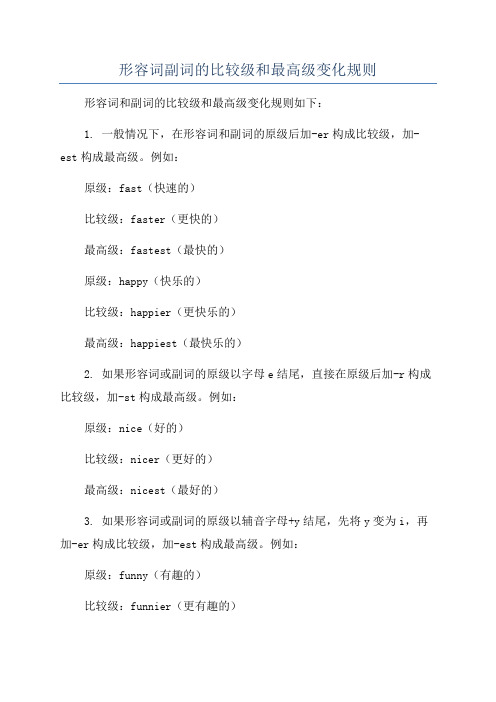
形容词副词的比较级和最高级变化规则形容词和副词的比较级和最高级变化规则如下:
1. 一般情况下,在形容词和副词的原级后加-er构成比较级,加-est构成最高级。
例如:
原级:fast(快速的)
比较级:faster(更快的)
最高级:fastest(最快的)
原级:happy(快乐的)
比较级:happier(更快乐的)
最高级:happiest(最快乐的)
2. 如果形容词或副词的原级以字母e结尾,直接在原级后加-r构成比较级,加-st构成最高级。
例如:
原级:nice(好的)
比较级:nicer(更好的)
最高级:nicest(最好的)
3. 如果形容词或副词的原级以辅音字母+y结尾,先将y变为i,再加-er构成比较级,加-est构成最高级。
例如:
原级:funny(有趣的)
比较级:funnier(更有趣的)
最高级:funniest(最有趣的)
4.一些形容词及副词的比较级和最高级形式不规则,需要进行记忆。
例如:
原级:good(好的)
比较级:better(更好的)
最高级:best(最好的)
原级:bad(坏的)
比较级:worse(更差的)
最高级:worst(最差的)
原级:far(远的)
比较级:farther(更远的)
最高级:farthest(最远的)
总的来说,形容词和副词的比较级和最高级的变化规则大致为在原级后添加-er和-est,但也有一些特殊情况需要记住。
初中八年级英语《形容词与副词的比较级和最高级》名师优质课PPT教学课件

outgoing serious important lazy quiet funny fat high difficult hard comfortable
一、形容词和副词比较级和最高级的构成
不规则变化 原级
good / well bad / badly/ill many / much
形容词与副词的 比 较 级和最高 级
学习目标
1.掌握形容词、副词的比较级和最 高级的构成
2.学会运用形容词、副词的比较级 和最高级
Show Learning aims
形容词和副词的比较级和最高级
大多数形容词和副词有三个等级: 1、原级,即原形。(没有比较时用原级) 2、比较级,表示“较……”或 “更……一些”。(两者比较时用比较
little
far
old
比较级 better worse more less farther further older elder
最高级 best west oldest eldest
二、形容词和副词的比较级和最高级的用法
1、表示“比……更……”,用“比较级+ than” 结构。She is taller than her sister.
C. better
D. gooder
4. This one is too large. Can you show me a __________one?
A. larger
B. large
D. smaller
C. small
5. —Do you think March is __________ than January?
2.Who / Which + 比较级 , A or B ? Who is taller, Mary or Tom?
形容词副词比较级最高级变化形式归纳(超全)
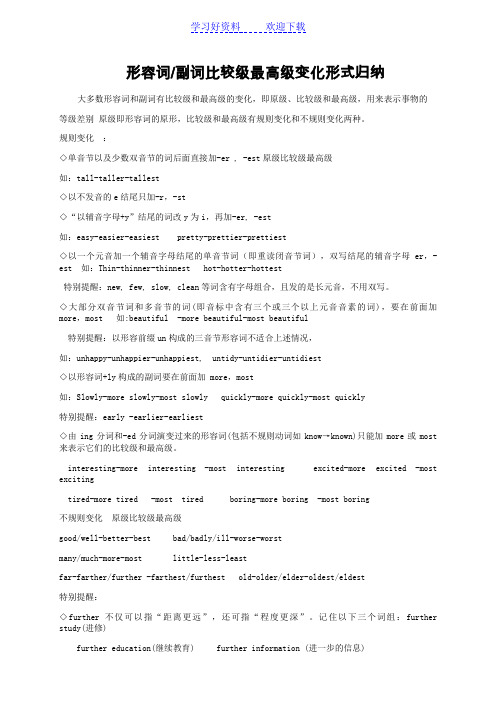
形容词/副词比较级最高级变化形式归纳大多数形容词和副词有比较级和最高级的变化,即原级、比较级和最高级,用来表示事物的等级差别原级即形容词的原形,比较级和最高级有规则变化和不规则变化两种。
规则变化:◇单音节以及少数双音节的词后面直接加-er , -est原级比较级最高级如:tall-taller-tallest◇以不发音的e结尾只加-r,-st◇“以辅音字母+y”结尾的词改y为i,再加-er, -est如:easy-easier-easiest pretty-prettier-prettiest◇以一个元音加一个辅音字母结尾的单音节词(即重读闭音节词),双写结尾的辅音字母er,-est 如:Thin-thinner-thinnest hot-hotter-hottest特别提醒:new, few, slow, clean等词含有字母组合,且发的是长元音,不用双写。
◇大部分双音节词和多音节的词(即音标中含有三个或三个以上元音音素的词),要在前面加more,most 如:beautiful -more beautiful-most beautiful特别提醒:以形容前缀un构成的三音节形容词不适合上述情况,如:unhappy-unhappier-unhappiest, untidy-untidier-untidiest◇以形容词+ly构成的副词要在前面加 more,most如:Slowly-more slowly-most slowly quickly-more quickly-most quickly特别提醒:early -earlier-earliest◇由ing分词和-ed分词演变过来的形容词(包括不规则动词如know→known)只能加more或most 来表示它们的比较级和最高级。
interesting-more interesting -most interesting excited-more excited -most excitingtired-more tired -most tired boring-more boring -most boring不规则变化原级比较级最高级good/well-better-best bad/badly/ill-worse-worstmany/much-more-most little-less-leastfar-farther/further -farthest/furthest old-older/elder-oldest/eldest特别提醒:◇further不仅可以指“距离更远”,还可指“程度更深”。
初中语法:形容词及副词的比较级、最高级
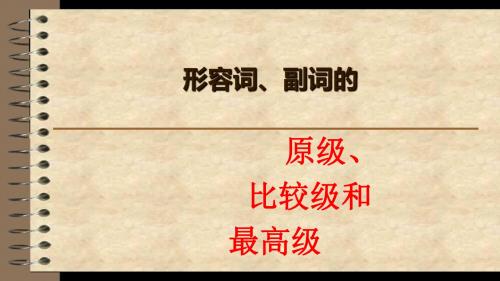
4、一般的形容词或副词的比较级前面可以加much/a little/even/still,而表示 数量的more之前还可以加some/any/no/one/two/many/several/a lot 等词。
如:It is much hotter today than yesterday. 今天比昨天热多了。 Would you like some more coffee? 你还要些咖啡吗? He did not eat any more. 他没有再吃。
5、more than /less than 分别可以理解为“多于/少于”,相当于 副词, more than = over; less than = under.
如:I lived in New Youk for more than four months. 我在纽约生活了四个多月。 6、“one of the +最高级+名词(复数)”整个短语为单数形式,谓语要用 单数形式。 如:One of the oldest house has been burned in a fire. 最古老的一幢房子在一场大火中被烧毁了。
※两者之 间没有差别时,使用句型:
主语(第一个人物)+谓语动词+as+形容词/副词原级+as+第二个人物
+...
如:He is as excited as his younger sister. 他和他妹妹一样兴奋。 ※ 表示第一个人比不上第二个人时,使用句型: 主语(第一个人物)+谓语动词(否定式)+as/so+形容词/副词原级 +as+第二个人物+... 如:He is not as/so excited as his younger sister. 他没他妹妹那么兴奋。
初中英语外研版八年级上册《形容词和副词的比较级和最高级》课件

heavy light
The football is __c_h_ea_p_e_r_ than the bench. The bench is __m__o_re__ex_p_e_n_si_v_e__ than the football. The bike is ____th_e_ m__o_s_t__ex_p_e_n_si_v_e___ of all.
• 1.玲玲的英语很好,大明的英语比玲玲还好,Tony的英语最好。 • 2. 这个书包不好,那个书包更差,李雷的书包是最差的。 • 3.Mary住得很远,David住得更远,我是住得最远的。
• -1.Lingling’s English is good, Daming’s English is better than her, Tony’s English is the best of all.
the safest far
the most comfortable
the farthest
giraffes tall, animals
They are the tallest animals.
最高级,表示最…的
elephants
big, animals
the Great Wall
long, wall
比一比,说一说.
Green ruler is long.
Yellow ruler is longer than the green ruler.
Red ruler is the longest.
Xiao ang
Xiao Hua
Xiao Ming
Xiao Hua is taller than xiao Fang
比较,来表达最高、最远、最快等意义
初中英语必会形容词与副词的比较级和最高级
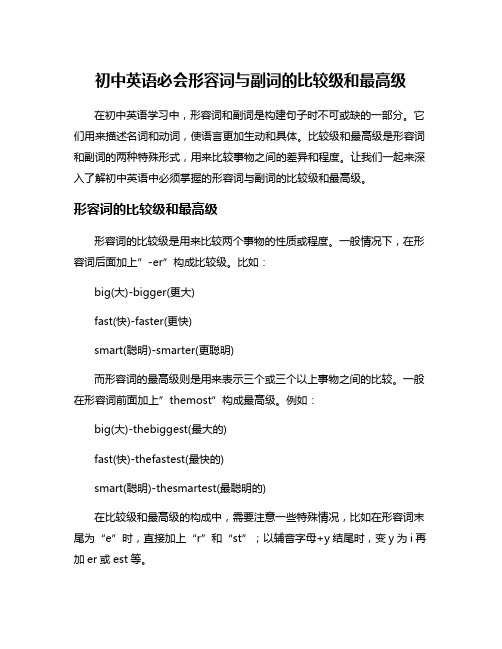
初中英语必会形容词与副词的比较级和最高级在初中英语学习中,形容词和副词是构建句子时不可或缺的一部分。
它们用来描述名词和动词,使语言更加生动和具体。
比较级和最高级是形容词和副词的两种特殊形式,用来比较事物之间的差异和程度。
让我们一起来深入了解初中英语中必须掌握的形容词与副词的比较级和最高级。
形容词的比较级和最高级形容词的比较级是用来比较两个事物的性质或程度。
一般情况下,在形容词后面加上”-er”构成比较级。
比如:big(大)-bigger(更大)fast(快)-faster(更快)smart(聪明)-smarter(更聪明)而形容词的最高级则是用来表示三个或三个以上事物之间的比较。
一般在形容词前面加上”themost”构成最高级。
例如:big(大)-thebiggest(最大的)fast(快)-thefastest(最快的)smart(聪明)-thesmartest(最聪明的)在比较级和最高级的构成中,需要注意一些特殊情况,比如在形容词末尾为“e”时,直接加上“r”和“st”;以辅音字母+y结尾时,变y为i再加er或est等。
副词的比较级和最高级副词也有比较级和最高级的形式,用来描述动词的程度或频率。
一般情况下,在副词前面加上”more”构成比较级。
例如:quickly(快速地)-morequickly(更快地)easily(容易地)-moreeasily(更容易地)happily(快乐地)-morehappily(更快乐地)副词最高级的构成则在副词前加上”themost”。
比如:quickly(快速地)-themostquickly(最快速地)easily(容易地)-themosteasily(最容易地)happily(快乐地)-themosthappily(最快乐地)掌握形容词和副词的比较级和最高级,能够帮助我们更准确地表达想法和观点,使语言更具有说服力和表现力。
形容词与副词的比较级和最高级是初中英语学习中的重要内容,掌握好这一部分知识,将有助于提升语言表达能力,希望大家能够在学习中多加练习,取得更好的成绩。
初中英语形容词和副词的比较级和最高级
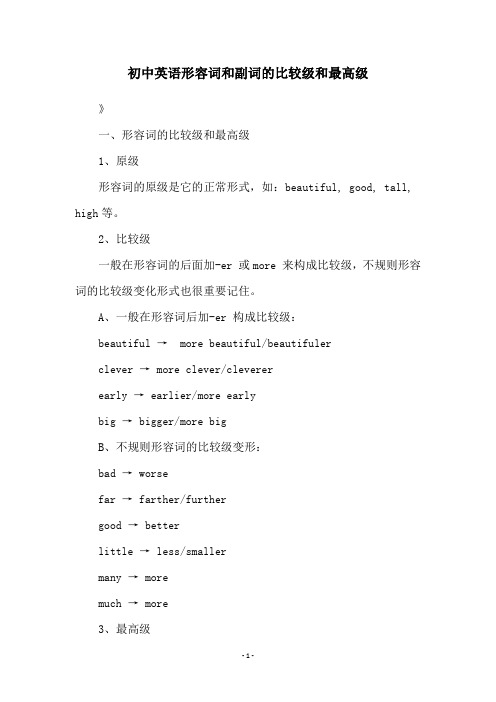
初中英语形容词和副词的比较级和最高级》一、形容词的比较级和最高级1、原级形容词的原级是它的正常形式,如:beautiful, good, tall, high等。
2、比较级一般在形容词的后面加-er 或more 来构成比较级,不规则形容词的比较级变化形式也很重要记住。
A、一般在形容词后加-er 构成比较级:beautiful → more beautiful/beautifulerclever → more clever/clevererearly → earlier/more earlybig → bigger/more bigB、不规则形容词的比较级变形:bad → worsefar → farther/furthergood → betterlittle → less/smallermany → moremuch → more3、最高级一般在形容词前面加the most 或者最高级的词本身来构成最高级。
A、在某些形容词前加the most来构成最高级:beautiful → the most beautifulclever → the most cleverearly → the earliestbig → the biggestB、不规则形容词的最高级变形:bad → the worstfar → the farthest/the furthestgood → the bestlittle → the least/the smallestmany → the mostmuch → the most二、副词的比较级和最高级1、原级副词的原级是它的正常形式,如:carefully, nicely, quickly, slowly等。
2、比较级一般在副词前加more 来构成比较级,不规则副词的比较级变化形式也很重要记住。
A、一般在副词前加more 来构成比较级:carefully → more carefullynicely → more nicelyquickly → more quicklyslowly → more slowlyB、不规则副词的比较级变形:well → betterbadly → worsefar → farther/further3、最高级一般在副词前加the most 来构成最高级。
初中英语知识点归纳形容词和副词的比较级和最高级
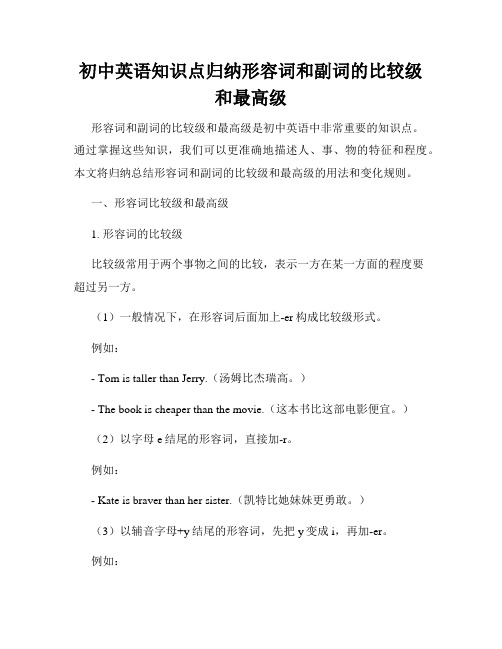
初中英语知识点归纳形容词和副词的比较级和最高级形容词和副词的比较级和最高级是初中英语中非常重要的知识点。
通过掌握这些知识,我们可以更准确地描述人、事、物的特征和程度。
本文将归纳总结形容词和副词的比较级和最高级的用法和变化规则。
一、形容词比较级和最高级1. 形容词的比较级比较级常用于两个事物之间的比较,表示一方在某一方面的程度要超过另一方。
(1)一般情况下,在形容词后面加上-er构成比较级形式。
例如:- Tom is taller than Jerry.(汤姆比杰瑞高。
)- The book is cheaper than the movie.(这本书比这部电影便宜。
)(2)以字母e结尾的形容词,直接加-r。
例如:- Kate is braver than her sister.(凯特比她妹妹更勇敢。
)(3)以辅音字母+y结尾的形容词,先把y变成i,再加-er。
例如:- This shirt is prettier than that one.(这件衬衫比那件更漂亮。
)(4)部分双音节和多音节形容词在前面加上more来构成比较级形式。
例如:- He is more intelligent than his classmates.(他比他的同学们更聪明。
)2. 形容词的最高级最高级用于三个或三个以上的事物之间的比较,表示一方在某一方面的程度是所有事物中最高的。
(1)在形容词后面加上-est构成最高级形式。
例如:- Alice is the tallest girl in the class.(艾丽斯是班上最高的女孩。
)- This is the cheapest phone I've ever seen.(这是我见过的最便宜的手机。
)(2)以字母e结尾的形容词,直接加-st。
例如:- It is the largest lake in the city.(这是城市里最大的湖。
)(3)以辅音字母+y结尾的形容词,先把y变成i,再加-est。
英语副词和形容词的最高级和比较级
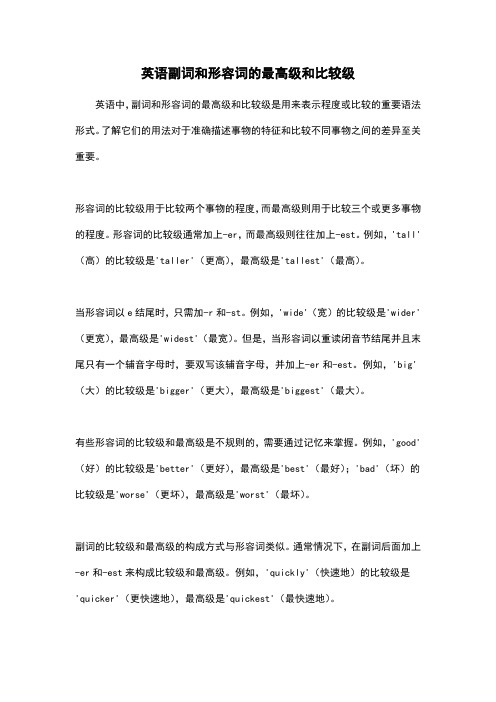
英语副词和形容词的最高级和比较级英语中,副词和形容词的最高级和比较级是用来表示程度或比较的重要语法形式。
了解它们的用法对于准确描述事物的特征和比较不同事物之间的差异至关重要。
形容词的比较级用于比较两个事物的程度,而最高级则用于比较三个或更多事物的程度。
形容词的比较级通常加上-er,而最高级则往往加上-est。
例如,'tall'(高)的比较级是'taller'(更高),最高级是'tallest'(最高)。
当形容词以e结尾时,只需加-r和-st。
例如,'wide'(宽)的比较级是'wider'(更宽),最高级是'widest'(最宽)。
但是,当形容词以重读闭音节结尾并且末尾只有一个辅音字母时,要双写该辅音字母,并加上-er和-est。
例如,'big'(大)的比较级是'bigger'(更大),最高级是'biggest'(最大)。
有些形容词的比较级和最高级是不规则的,需要通过记忆来掌握。
例如,'good'(好)的比较级是'better'(更好),最高级是'best'(最好);'bad'(坏)的比较级是'worse'(更坏),最高级是'worst'(最坏)。
副词的比较级和最高级的构成方式与形容词类似。
通常情况下,在副词后面加上-er和-est来构成比较级和最高级。
例如,'quickly'(快速地)的比较级是'quicker'(更快速地),最高级是'quickest'(最快速地)。
同样地,有些副词的比较级和最高级也是不规则的。
例如,'well'(好地)的比较级是'better'(更好地),最高级是'best'(最好地);'badly'(糟糕地)的比较级是'worse'(更糟糕地),最高级是'worst'(最糟糕地)。
初中英语语法:形容词副词比较最高级
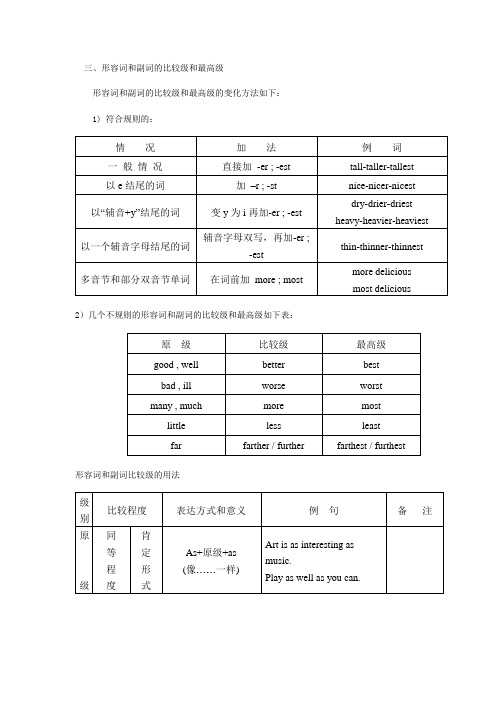
三、形容词和副词的比较级和最高级形容词和副词的比较级和最高级的变化方法如下:1) 符合规则的:2)几个不规则的形容词和副词的比较级和最高级如下表:形容词和副词比较级的用法注意:有些形容词,如 dead, empty, round, sure, woolen 等受本身含义的限制,没有比较级。
例题解析:举一反三,学的更轻松!He is ________ friends than I.A. much moreB. many moreC. very moreD. too more解析:后面有可数名词复数时, many的比较级形式为many more 修饰。
应选B.2. Which is the _________ country, Japan or Australia?A. more developedB. more developingC. most developedD. most developing解析:两者比较用比较级,表示"发达"用 developed, 而developing 是 "发展中的" 意思3.There were _______ shops in the city in 1982 than in 1990.A. littleB. fewC. fewerD. less解析:little 不能修饰可数名词,两者比较需用比较级,所以应选C.4. If you are not free today, come another day __________.A. tooB. soC. insteadD. yet解析:instead 作副词用时意为"代替,顶替",表示前面的事情没做,而是做了后面的事。
Instead一般位于句首。
应选C.5.He can't tell us ________, I think.A. important anythingB. anything importantC. important somethingD. something important.解析:不定代词与形容词联用需后置,否定句中应该用anything而不是something. 因此应选B6. The Huang River is the second __________ river in our country.A. longB. longerC. longestD. the longest解析:"定冠词the+ 序数词 + 形容词最高级 " 表示"第几大……" 应选C.7. The light in the office wasn't ________for him to read.A. enough brightB. bright enoughC. brightlyD. enough brightly解析:enough修饰名词时可前可后,修饰形容词或副词时,要后置。
初中英语知识归纳形容词和副词的比较级和最高级构成

初中英语知识归纳形容词和副词的比较级和最高级构成形容词和副词是英语中常见的词性,用来修饰名词或者动词等。
比较级和最高级是形容词和副词构成的两种特殊形式,在句子中用来表达两个或多个事物之间的比较关系。
本文将对初中英语知识中的形容词和副词的比较级和最高级进行归纳和总结。
一、形容词的比较级和最高级构成方式1. 一般情况下,在形容词的原级后面加上"-er"构成比较级,加上"-est"构成最高级。
例如:原级:tall(高的)比较级:taller(更高的)最高级:tallest(最高的)2. 以"e"结尾的形容词,在原级后面只需加上"-r"和"-st"。
例如:原级:large(大的)比较级:larger(更大的)最高级:largest(最大的)3. 以辅音字母+y结尾的形容词,把"y"变为"i",再加上"-er"和"-est"。
例如:原级:happy(快乐的)比较级:happier(更快乐的)最高级:happiest(最快乐的)4. 以重读闭音节结尾,并且末尾只有一个辅音字母的形容词,要双写这个辅音字母,再加上"-er"和"-est"。
例如:原级:big(大的)比较级:bigger(更大的)最高级:biggest(最大的)5. 部分形容词的比较级和最高级是不规则的,需要特殊记忆。
例如:原级:good(好的)比较级:better(更好的)最高级:best(最好的)二、副词的比较级和最高级构成方式1. 大多数副词的比较级和最高级构成方式与形容词相同,在副词的原级后面加上"-er"和"-est"。
例如:原级:quickly(快速地)比较级:more quickly(更快地)最高级:most quickly(最快地)2. 以"e"结尾的副词,在原级后面只需加上"-r"和"-st"。
初中英语 形容词比较级和最高级规律和不规则变化
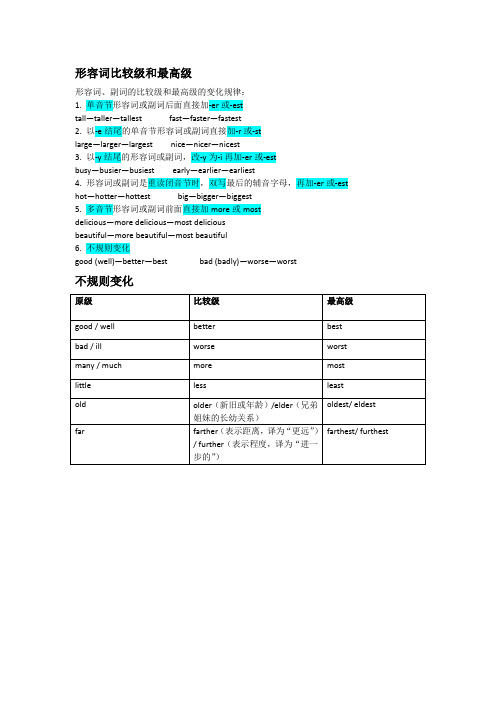
形容词比较级和最高级
形容词、副词的比较级和最高级的变化规律:
1.单音节形容词或副词后面直接加-er或-est
tall—taller—tallest fast—faster—fastest
2. 以-e结尾的单音节形容词或副词直接加-r或-st
large—larger—largest nice—nicer—nicest
3. 以-y结尾的形容词或副词,改-y为-i再加-er或-est
busy—busier—busiest early—earlier—earliest
4. 形容词或副词是重读闭音节时,双写最后的辅音字母,再加-er或-est
hot—hotter—hottest big—bigger—biggest
5.多音节形容词或副词前面直接加more或most
delicious—more delicious—most delicious
beautiful—more beautiful—most beautiful
6.不规则变化
good (well)—better—best bad (badly)—worse—worst
不规则变化
原级
比较级
最高级
good / well
better
best
bad / ill
worse
worst
many / much
more
most
little
less
least
old
older(新旧或年龄)/elder(兄弟姐妹的长幼关系)
ol(表示距离,译为“更远”)/ further(表示程度,译为“进一步的”)
初中英语语法知识:比较级与最高级
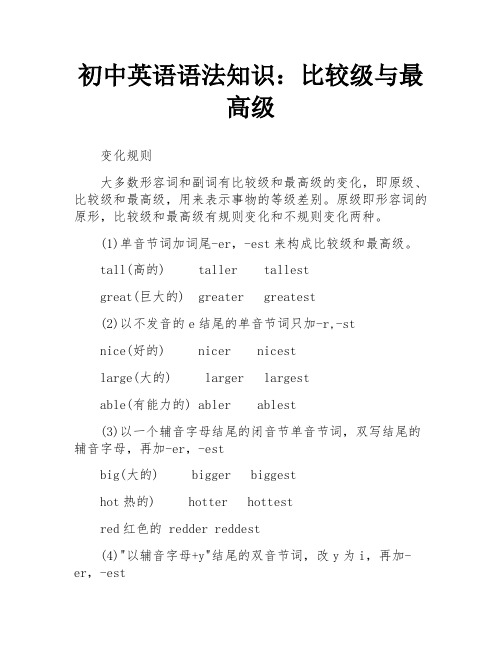
初中英语语法知识:比较级与最高级变化规则大多数形容词和副词有比较级和最高级的变化,即原级、比较级和最高级,用来表示事物的等级差别。
原级即形容词的原形,比较级和最高级有规则变化和不规则变化两种。
(1)单音节词加词尾-er,-est来构成比较级和最高级。
tall(高的) taller tallestgreat(巨大的) greater greatest(2)以不发音的e结尾的单音节词只加-r,-stnice(好的) nicer nicestlarge(大的) larger largestable(有能力的) abler ablest(3)以一个辅音字母结尾的闭音节单音节词,双写结尾的辅音字母,再加-er,-estbig(大的) bigger biggesthot热的) hotter hottestred红色的 redder reddest(4)"以辅音字母+y"结尾的双音节词,改y为i,再加-er,-esteasy(容易的) easier easiestbusy(忙的) busier busiest(5)以ly结尾的副词,除early-earlier-earliest,其他都是加more most.Slowly-more slowly-most slowlyBravely-more bravely-most bravelyquickly-more quickly-most quickly(6)少数以-er,-ow结尾的双音节词未尾加-er,-estclever(聪明的) cleverer cleverestnarrow(窄的) narrower narrowest(7)其他双音节词和多音节词在前面加more,most来构成比较级和最高级。
如:important(重要的) more important most importanteasily(容易地) more easily most easily(8)一些词的比较级和最高级,可以加-er或 -est,也可以加more或most,如:clever, polite等。
- 1、下载文档前请自行甄别文档内容的完整性,平台不提供额外的编辑、内容补充、找答案等附加服务。
- 2、"仅部分预览"的文档,不可在线预览部分如存在完整性等问题,可反馈申请退款(可完整预览的文档不适用该条件!)。
- 3、如文档侵犯您的权益,请联系客服反馈,我们会尽快为您处理(人工客服工作时间:9:00-18:30)。
形容词、副词的比较级和最高级一.形容词和副词的比较级和最高级的变化方法如下(1) 符合规则的:(2)注意:有些形容词,如 dead, empty, round, sure, woolen 等受本身含义的限制,没有比较级。
三.形容词副词比较级最高级的其他用法(1)和冠词连用the +形容词原级+v(复),指一类人或物the + 形容词比较级,指两者中“较…的”的那一个,eg. the younger of the twoa/ an +形容词比较级eg. The pen is expensive. I want a cheaper one. ( a) +most +形容词最高级 “非常…” eg. a most beautiful city( 2 ) 相关结构1) 原级比较:肯定句 as….as…., 否定句not so / as….as…..2) 比较句: 比较级 +than….或more (less) ….than…..The furniture in this shop is less beautiful than that in that shop.(注意代词that 的用法)3) 比较级+ and +比较级 或 more and more +比较级 “越来越… ”richer and richer, more and more interesting4) The more….., the more…..“越…, 越…”The more you look at the picture, the better you will like it.5) 比较级+than any other +n. (单) (适用于范围一致时)(all) other +n.(复)any +n.(单) (适用于范围不一致时)He is taller than any other student / all other students in his class. any student in my class.6) 倍数表达法。
A is three(four, etc.)times the size(height, length etc.)of B.A is three(four, etc.)times as big(high, long, etc.)as B.A is three (four, etc.)times bigger(higher, longer, etc.)than B.用times 表倍数通常用于三倍以上,两倍可以用twice或double.The new building is four times the size (the height)of the old one.这座新楼比那座旧楼大三倍(高三倍)。
Asia is four times as large as Europe.亚洲比欧洲大三倍。
Your school is three times bigger than ours.你们的学校比我们的学校大三倍。
7) more…than…结构,其意往往是…rather than…,可译为“是……而不是……”或颠倒词序译作“与其说是……,不如说是……”。
That little girl is more tired than hungry. 那个小姑娘是累了而不是饿了。
She is more a mother than a wife或She is more of a mother than a wife.她是贤妻,更是良母。
8) A is to B what C is to D A和B的关系就像C和D的关系Air is to man what water is to fish. 空气对于人类就像水和鱼的关系。
9) no more than= only “只不过”,言其少not more than=at most “不多于”,“至少”,指事实。
no more …than… 和…一样不… 如单音节使用比较级形式not more…than… 不比…更…no less than= as much as “多达”no fewer than= as many as例:I have no more than five yuan in my pocket. 我口袋里的钱只不过5元。
I have not more than five yuan in my pocket. 我口袋里的钱不多于5元。
He is no richer than I.他和我一样穷。
He is no less determined than you. 他的决心不亚于你。
(no less determined than等于“其决心不亚于你”,言其大)He is not less determined than you. 他的决心不比你小。
(not less determined than等于“其决心不小于”,无言其大或小的含义)10) 最高级+of/ in/ among….He is the tallest of the three/ among them/ in is class.四.相关词语辨析1.very 和muchA)very修饰形容词、副词的原级;much修饰比较级;修饰动词用much 或very much ,eg. I very like English.(×),因改为:I like English very much.B) 表示状态的过去分词前用very。
a very frightened boy, a very tired child .一般的情况下以-ed结尾的分词多用much、very much / greatly等修饰。
如:We were greatly /much shocked by the news about Tom..C) 已转化为形容词的现在分词前用very。
如:very interesting / worrying / excitingD)too前用much/ far ,不用very。
You are much / far / a lot too nice.另外,在too many / much, too few / little前用far。
We’ve got far too many eggs and far too few egg cups.E)还有修饰词既不用very,也不用much.eg. be well worth doing, be well above the tree2. so和suchA)so … that … 与such … that … 的区别。
so + 形容词/ 副词+ that …so + 形容词+ a(n)+ 单数可数名词+ that …so + many / much / little / few + 名词+ that …such + a(n)+ 形容词+单数可数名词+ that …such + 形容词+ 不可数名词+ that …such + 形容词+ 复数名词+ that …注意:但当little表示“小”时用such。
如:These are such little boys that they can’t dress t hemselves.下列so的用法是错误的:so a difficult problem, so difficult problems, so hot weather。
B) some/ any/ every/ no/ each/ all/ another/ several/ few/ many/ one/ two +such+n. eg. no such word3. be too much + n.be much too+ adj.be too much for sb. 对…太过分了4. can’t be too +adj.= can’t be +adj.+ enough “无论…都不为过”You can never be careful enough.= You can never be too careful.你越小心越好。
练习与巩固1 Don't worry, sir. I'm sure I can run _________ to catch up with them.A. slowly enoughB. enough slowlyC. fast enoughD. enough fast2. The text is very easy for you. There are ________ new words in it.A. a fewB. a littleC. fewD. little3. It's such an ________ film that all the students are ______ in it.A. interesting; interestedB. interested; interestingC. interesting; interestingD. interested; interested; interested4. Mingming got up very _______,so he came to school half an hour ______.A. late; latelyB. lately; lateC. lately; latelyD. late; late5. I am ________ worried about y parents' healthy conditions.A. some timesB. sometimeC. sometimesD. some times6. We don't have ________ every day.A. a lot of school worksB. many school workC. any school worksD. much school work7. -Look! How fast the two horses are running!--Oh, yes! They are nearly _______.A. up and downB. slower and slowerC. more or lessD. neck and neck8. ______ children there are in family,_______ their life will be.A. The less; the betterB. The fewer; the betterC. Fewer; richerD. More; poorer9. Most of the people in Guangdong are getting ________.A. more and more richB. more rich and more richC. richer and richerD. richer and richest10. Which lesson is _______, this one or that one?A. difficultB. much difficultC. more difficultD. the most difficult11. "A ______ accident happened at 7:30 a.m." said the policeman _______.A. serious, seriousB. seriously, seriouslyC. seriously, seriousD. serious,seriously12. ________ is it from our school to Lupu Bridge?A. How longB. How oftenC. How farD. How much13. In our city, it is ______ in July, but it is even _______ in August.A. hotter; hottestB. hot; hotC. hotter; hotD. hot; hotter14. This pencil is ______ that one.A. so long asB. as longer asC. longer thanD. not as longest as15. The station is two kilometers _______ the hospital.A. away toB. far awayC. far fromD. away from16. Beijing has ______ many buses that there is often a traffic jam in rush hours.A. soB. veryC. tooD. much17. This box is ______ heavy ________ I can't carry it.A. too, toB. so, thatC. very, thatD. too, that18. India has the second _______ population in the world.A. largerB. mostC. smallestD. largest19. Mary received ________ many postcards at Christmas.A. soB. suchC. tooD. even20. The cake smells ______. Please throw it away.A. goodB. badlyC. badD. wellKey1-5 CCADC 6-10 DDBCC 11-15 DCDCD 16-20 ABDAC。
